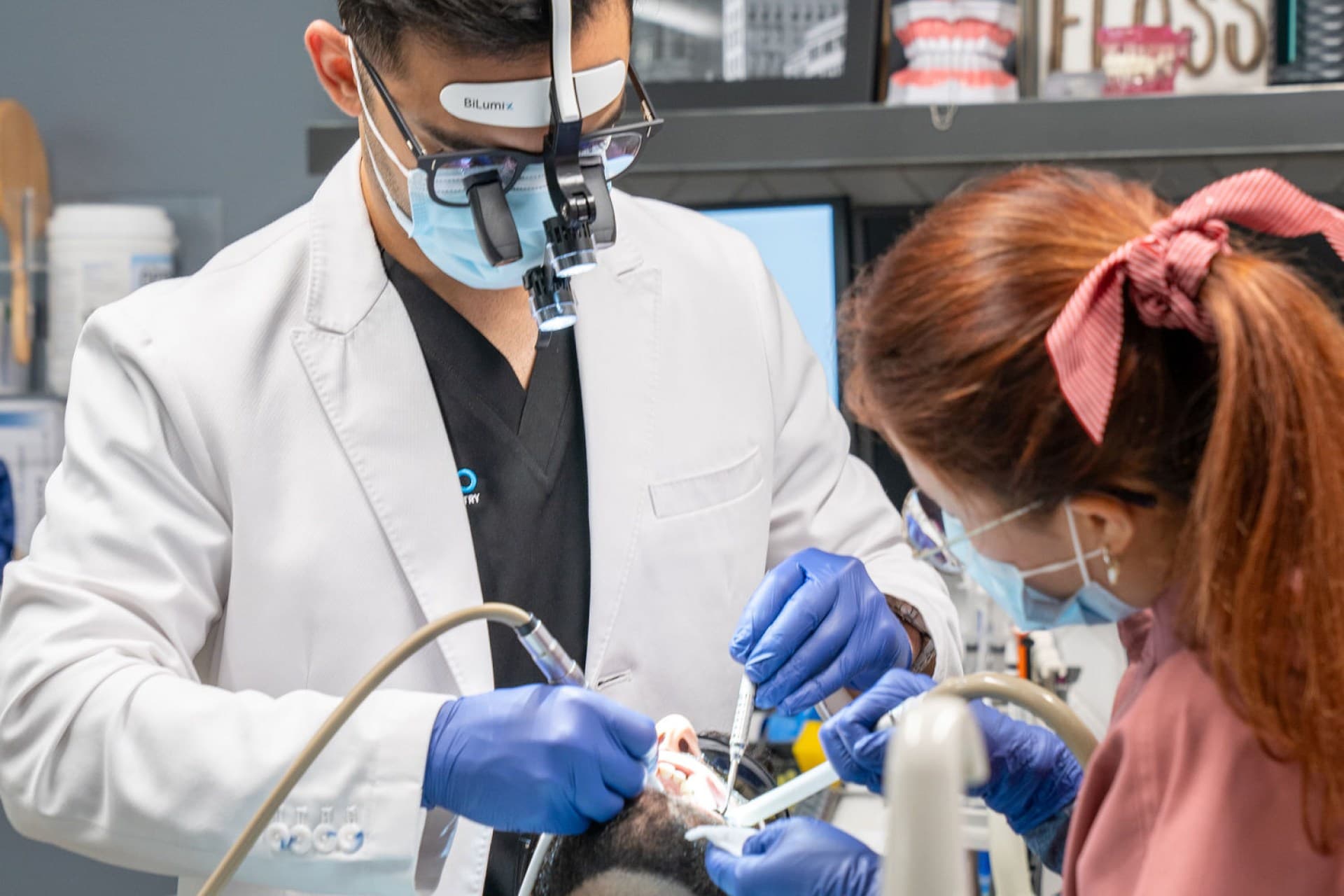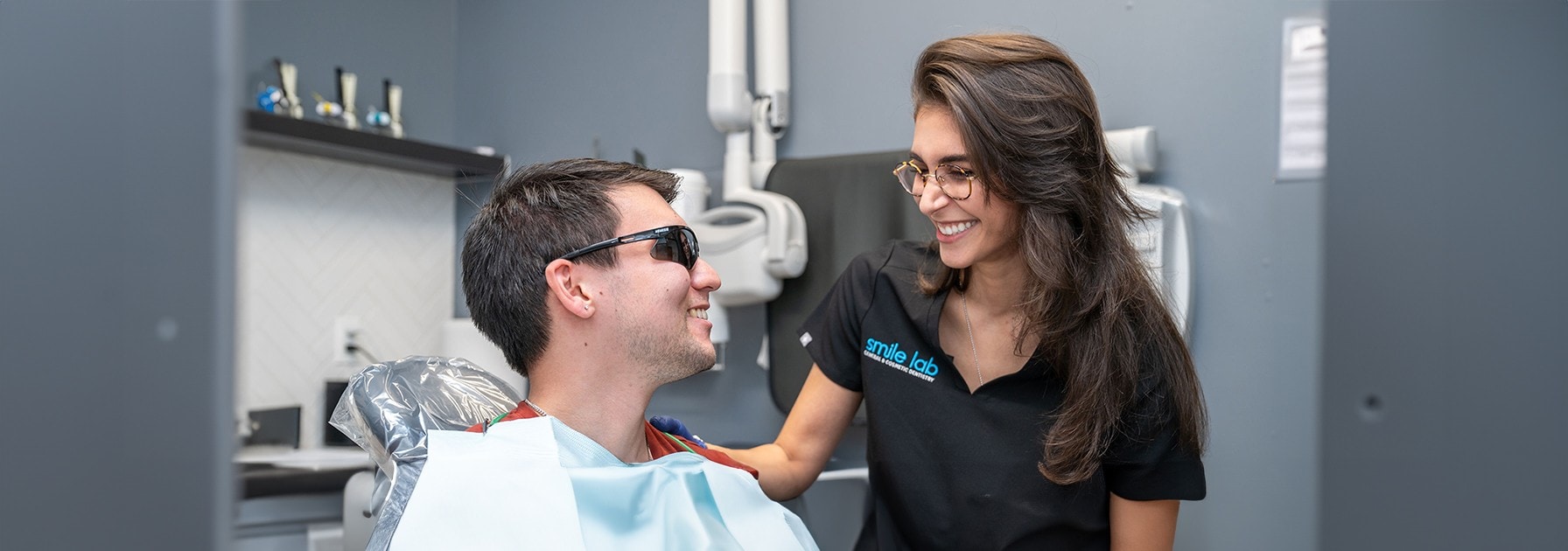Wisdom Teeth
Although most individuals develop and grow 32 permanent adult teeth, sometimes the size of their jaws can be insufficient to accommodate the four wisdom teeth. When there isn’t enough space for these teeth to erupt properly, they are referred to as impacted wisdom teeth. This means that they are unable to emerge into the correct position for chewing and cleaning. If they do erupt from the gum, there is often no space for them, leading to overcrowding.
We would recommend a consultation at Smile Lab in New York, NY, to determine whether wisdom tooth removal would be beneficial for you. Our team will take a special X-ray of your mouth and jaws to assess whether your wisdom teeth are impacted if there is sufficient room for eruption, and the level of difficulty in removing them.
- Soft Tissue Impaction — Insufficient room for the gum tissue to retract, leading to difficulties in adequately cleaning the tooth.
- Partial Bony Impaction — Enough space for the wisdom tooth to partially emerge, but it cannot function properly during the chewing process, resulting in cleaning challenges and other issues.
- Complete Bony Impaction — No space for the tooth to erupt, causing it to remain embedded in the jaw bone. If partially visible, complex surgical techniques are required for removal. The impacted wisdom tooth may also be in an unusual position, making the extraction process more challenging. This situation can occur when the jaw bone’s shape or size, along with other facial structures, increases the complexity of the tooth’s removal.
With an oral examination and X-rays of the mouth, your doctor can evaluate the position of the wisdom teeth and predict if there are present or future potential problems. Studies have shown that early evaluation and treatment result in better outcomes for the patient and fewer complications with surgery. Patients should generally receive their first evaluation in the mid-teen years.
All outpatient surgery is performed under appropriate anesthesia to maximize patient comfort. Contact our team today for more information on wisdom teeth extraction.
Dental Implants
Tooth loss can happen for a variety of reasons, such as decay, injury, or gum disease. While it is always our aim at Smile Lab to make the most of your natural teeth, sometimes a replacement tooth is needed. Luckily, our team of dentists has specialized in restorative dentistry, so we can have your smile looking brand new.
Dental implants have gained popularity as an excellent choice for replacing missing teeth. Their durability, natural appearance, and functionality are just a few of their remarkable features. These implants consist of a titanium post that is surgically placed into the jawbone, mimicking the root structure of a natural tooth. Following the healing process, a custom-made crown is affixed to the post, providing a replacement tooth that seamlessly blends in with your natural smile.
One of the key advantages of dental implants is their ability to stimulate bone growth, effectively preventing the bone loss commonly associated with missing teeth. Not only does this preserve your facial structure, but it also ensures a stable foundation for the implant, keeping it securely in place.
At Smile Lab, our team of highly skilled professionals utilizes the latest techniques and top-quality materials to deliver the best possible outcomes for our patients. We work closely with you to design a dental implant that perfectly matches the color, size, and shape of your existing teeth, resulting in a flawless enhancement to your smile.
Whether you need a single-tooth replacement or a complete set of teeth replacements, dental implants provide a robust and long-lasting solution that improves your oral health and boosts your confidence.
Experience the exceptional care and expertise of Smile Lab in New York, NY, and let us help transform your smile with our state-of-the-art dental implant services.
Tooth Extractions
Our goal is to preserve your natural smile, but sometimes, a tooth is beyond repair and the best solution for your health is to remove it. From overcrowded wisdom teeth to severely decayed teeth, we provide our patients with safe, emphatic, and pain-free tooth extractions. We know how important your teeth are not just for your appearance but your overall health, that is why once your tooth extraction has been successfully completed, we can help find you the perfect solution to replace your missing tooth and have you back smiling!
The reasons for tooth extraction can vary, but this solution is used only when the tooth cannot be saved or restored with another treatment. Tooth extraction may be necessary if:
- Decay or infection has reached the surrounding tissue and inside of the tooth.
- A severely broken, chipped, or cracked tooth caused by trauma or injury may have to be fully removed.
- There are too many teeth in one area of the mouth, causing overcrowding and major alignment issues.
Tooth extractions can be broken up into two categories:
- Simple Extraction — This can be the removal of a tooth that is easily visible and needs to be extracted due to damage or decay. The dentist will numb the area and loosen the tooth (if it needs to be loosened) with a dental instrument called an elevator before removing it with forceps. A simple extraction is typically done within one visit.
- Surgical Extraction — This procedure is slightly more complex. This type of surgery is typical with teeth that may have been broken or have not erupted, such as wisdom teeth. The dentist may have to make an incision in the gum line and extract the remaining or hidden tooth.
Our team of dentists is always on hand to help you with any questions you may have about tooth extraction.
Bone Grafting
Our jawbones provide a foundation for our teeth, and if needed, a dental implant. If this bone has been weakened or damaged by injury, gum disease, or abscesses, it won’t be possible to support an implant. Bone grafting can help regenerate the bone. At your appointment, we will assess the amount of bone available using our 3D imaging. If sufficient bone loss is present, we can regenerate missing tissue with a bone graft. This involves placing artificial grafting material underneath the gum so it will fuse with your jawbone to create a sturdy structure for an implant. Bone grafting varies on a case-by-case basis. Contact our New York, NY office today so our team can assess you for this, and any of our dental implant treatments.
Sinus Lift
A sinus lift, also known as sinus augmentation, is a surgical procedure that increases the amount of bone in the upper jaw, specifically in the area of your molars and premolars. It’s often necessary when there isn’t enough bone height in the upper jaw, or the sinuses are too close to the jaw for dental implants to be placed.
The procedure involves lifting the sinus membrane upward and adding bone graft material into the space created. This additional bone provides a solid foundation for the placement of dental implants.
The most significant benefit is that it enables the successful placement of dental implants, providing a sturdy and reliable foundation. This means you can enjoy the advantages of dental implants, which include improved oral function, enhanced appearance, and greater self-confidence.
In addition to creating the necessary space for implants, a sinus lift can also help to prevent future bone loss. This is because the bone graft used in the procedure not only fills the space but also encourages new bone growth. This growth contributes to the overall strength and stability of your jawbone, providing long-term benefits.
Moreover, a sinus lift can alleviate potential complications linked to the close proximity of the sinuses and jaw. It can reduce the risk of sinus infections and enhance your overall oral health.
Sedation Dentistry
Anxiety and fear can get the best of us and research shows that over 60% of Americans have some level of dental anxiety. We believe anxiety should not get in the way of you receiving proper dental care. That’s why the team at Smile Lab has various sedation dentistry techniques for any patient who may find receiving dental care a stressful experience. Whether you need a mild sedative or a state of deep relaxation, our specialists can find the right treatment for you. Don’t put off getting that toothache looked at any longer. Request an appointment at our conveniently located New York, NY office today!
Nitrous Oxide
Also known as laughing gas, nitrous oxide produces a mild sedative effect. Unlike with other sedatives, you won’t have any short-term memory loss, just a feeling of calm and well-being while under treatment. Laughing gas is inhaled through a mask and takes effect right away. Plus, the nitrous oxide does not put you to sleep, so you can hear and respond to any of the dentist’s questions or instructions.
Our specialized team is on hand to administer the gas, carefully monitoring the amount you receive. Once you have finished treatment, the effects of the gas dissipate, allowing you to go about your day without any adverse reactions.
Conscious Sedation
Oral sedation puts you in complete control of the level of sedation you would like to achieve. This sedation is often in pill form and produces a mild to moderate effect, allowing the patient to relax while in the dental chair.
Oral sedation makes you quite groggy, and you may even fall asleep. But you’ll still be able to communicate with your dentist if necessary, and you’ll awaken with a gentle nudge. Because oral sedation temporarily affects your memory and motor skills, you’ll need a friend or family member to drive you home after your procedure.
Deep IV Sedation
IV sedation gives a deeper level of sedation than oral or nitrous oxide sedation and is the best option for those who are extremely anxious undergoing an oral surgery procedure. Some benefits of IV sedation include:
- No Memory of the Procedure — Most patients fall asleep and have little to no memory of their treatment when they wake up.
- No Sense of Time — You may feel as though the procedure lasted no time at all.
- No Anxiety During Treatment — You feel a deep sense of relaxation with IV sedation.
Throughout treatment, you will be monitored closely by a trained specialist so you can be sure that you are completely safe. This form of sedation can leave you drowsy afterward, so please have someone available to drive you home after your procedure.








